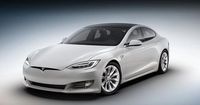In recent months, Tesla owners have been exchanging their electric vehicles for other brands at an unprecedented rate, suggesting a shift in consumer attitudes towards the automaker. According to a report from Edmunds, March has seen the "highest level" of Tesla vehicles traded in for new or used cars from other brands through dealerships, a notable trend that has sparked discussions in the automotive industry.
Jessica Caldwell, head of analytics at Edmunds, emphasized the potential implications of these changing consumer sentiments. In her analysis, she noted that a decline in loyalty to the Tesla brand might open doors for traditional automakers and new startups in the electric vehicle sector. Caldwell wrote, "If loyalty to the Tesla brand and interest in it weaken, then those who offer competitive prices, new technologies, or simply fewer contradictions can attract former Tesla owners and new buyers of electric vehicles." This outlook paints a concerning picture for Tesla, as reduced brand loyalty can lead to significant market shifts.
But how did we reach this point? Many factors have contributed to this downturn. Historical data shows that in August 2024, only 2% of American car buyers were unaware of Elon Musk, highlighting how intertwined his persona is with the Tesla brand. Moreover, Edmunds also reported a decline in inquiries for new Tesla models, with requests hitting their lowest levels since October 2022, following a peak in November 2024. This indicates growing consumer hesitancy and frustration.
Prior to Musk's announcement of his association with DOGE, Tesla had already faced challenges, experiencing a substantial value drop of 26%—equal to roughly $15 billion—over the course of 2024, marking it as the second-largest annual decline according to research firm Brand Finance. More troubling, the latest data shows that in the initial months of 2025, Tesla sales plummeted by 71% in Germany and 44% in France, which are two of the largest electric vehicle markets in the European Union. This decline raises alarms about Tesla's competitive edge and sustainability in a rapidly evolving market.
As the automotive landscape continues to shift, the appeal of Tesla appears to be fading for some consumers. Edmunds revealed that the demand for used Teslas has sharply dropped, contributing to a significant price decline for these electric cars. In fact, within just the last month, search queries for used Teslas in the United States fell by 16%, while interest in other electric models surged. CarGurus further confirmed this, stating that prices for used Teslas are now dropping at double the rate compared to average market rates.
The Cybertruck, in particular, is among the hardest hit models, with resale values reported to be 58% lower than their original prices. Analysts point to heightened competition as a substantial factor fueling this trend. The year 2024 saw the introduction of 76 different models of used electric cars available in the U.S. market, compared to just 58 models in 2023. This influx of options appears to be drawing consumers away from Tesla.
Another essential aspect contributing to this scenario is Tesla's current pricing strategy for new vehicles. The company has reduced the costs of its new models, indirectly affecting the resale values of its used cars. Industry experts warn that this pricing approach may backfire, leading to dissatisfaction among current Tesla owners.
Amid these unsettling developments, Tesla has remained silent regarding these significant trends. After Elon Musk's involvement in the Trump administration, protests against Tesla's facilities escalated, with incidents of violence including Molotov cocktail attacks and shootings targeting dealership windows reported by The Washington Post. The negative sentiment directed at Musk has intensified, primarily due to his ultra-right-wing stance and budget-cutting measures enacted through his DOGE agency.
Furthermore, on March 19, 2025, American investor Gerber, whose company owns approximately 260,000 shares of Tesla valued at about $105 million, publicly urged Musk to either refocus on the company or step down as CEO. He expressed concern that Musk was "simply destroying the company's reputation," a sentiment echoed by many worried shareholders and consumers.
This evolving situation raises pressing questions about the future of Tesla. Will the iconic brand manage to regain its footing in the electric vehicle market, or could it be facing a long-term decline as consumers seek alternatives? As industry dynamics change, traditional automakers and electric vehicle startups are primed to capitalize on any slip in Tesla’s dominance, potentially altering the landscape of the automotive world.
Ultimately, Elon Musk's personal brand, once a boon to Tesla’s appeal, now bears considerable weight on the company's fate. If consumers increasingly view Tesla through the lens of Musk's controversial actions and statements, the consequences could be substantial. The coming months will be critical in determining whether Tesla can innovate and attract new buyers, or if it will succumb to a market gravitating towards competitors offering more attractive options.


